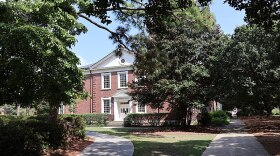The budget stalemate in the state legislature is causing anxiety among university leaders. The General Assembly appropriated more than $3.7 billion per year in the last state budget, two years ago.
This funding is a combination of nonrecurring and recurring allocations. Jennifer Haygood is the UNC System's Chief Financial Officer. She said that without a state budget, the UNC System can only operate under a recurring funding level from fiscal year 2025.
"So, there is some just sort of stuck on a pause while the General Assembly continues their deliberations," Haygood said in a July board meeting. "The General Assembly does return to town next week and we're just sort of in a wait and see mode."
While the UNC System is in "wait and see" mode, university leadership can't fill vacant positions, employees might not receive salary increases, and the UNC Board of Governors has to tweak its finances to ensure its institutions can continue operating properly.
On Thursday, the BOG voted to reallocate nearly $5.4 million of enrollment funding. The System increases or decreases universities' budgets depending on their amount and type of resident student credit hours (credit hours in STEM, for example, are funded at a higher level than non-STEM fields).

The BOG voted to decrease the enrollment budget for three institutions with declining credit hours. The decision reduced East Carolina's budget by $4.1 million, NC A&T State University's by $778,000, and Winston-Salem State University's by nearly $484,000.
The board rerouted those funds to universities it considers most at risk amid budget stalls: institutions with fewer than 8,000 students.
Brandy Andrews is the UNC System's Vice President for University Finance. She said if the board were to delay enrollment-related adjustments until the General Assembly passes a budget, it could pose a "financial management risk" to universities with low enrollment.
"These institutions are the most reliant on general fund appropriations," Andrews said at the Thursday board meeting. "(They have) fewer opportunities to offset enrollment fluctuations through other funding sources."
The $5.4 million reallocation upped enrollment funding for seven institutions, including a $2.4 million increase for NC Central, $1.2 million for Fayetteville State, and about $427,000 for UNC Asheville.
This money, however, will only cover about 51% of the universities' needs. Andrews said the UNC System needs an additional $46.3 million from the state legislature to fully fund those seven universities and its remaining institutions.
With the House and Senate unable to agree on a full budget, both chambers passed their own "mini budgets" in June, Haygood said the House's mini budget didn't contain any of the UNC System's priorities, including the enrollment funding.

Both chambers did, however, include the $46.3 million enrollment funding appropriation in their state budget proposals. It is unlikely legislators will pass anything before students return to campus next month.
WUNC partners with Open Campus and NC Local on higher education coverage.









